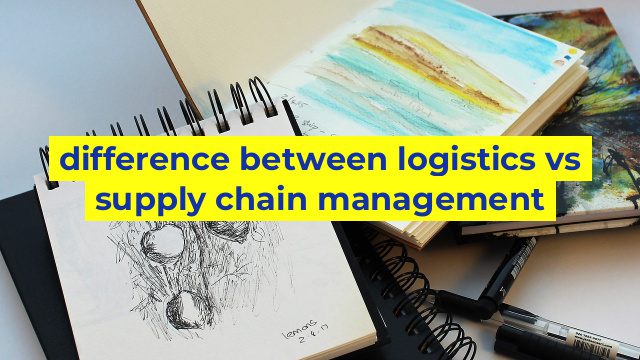Distinguishing Between Logistics and Supply Chain Management
When it comes to business operations, logistics and supply chain management are two terms that are often used interchangeably. However, they are two distinct concepts, each with its unique role and function. In this article, we will explore the difference between logistics and supply chain management.
Logistics Management
Logistics management refers to the process of planning, implementing, and controlling the movement of goods and services from the point of origin to the point of consumption. This process involves the coordination of various activities, such as transportation, warehousing, inventory management, and packaging.
Logistics management focuses primarily on the physical aspects of the delivery process, such as ensuring that products are delivered on time, managing the transportation network, and optimizing the use of warehouse space. It is concerned with the efficient and effective management of the entire distribution process, from the supplier to the end-user.
Supply Chain Management
Supply chain management, on the other hand, encompasses a broader range of activities that are involved in the production and delivery of products and services. It includes the procurement of raw materials, the transformation of these materials into finished goods, and the delivery of the final product to the customer.
Supply chain management involves the coordination of multiple stakeholders, including suppliers, manufacturers, distributors, and retailers. It is concerned with optimizing the entire supply chain, from the initial sourcing of raw materials to the final delivery of the product to the end customer.
Unlike logistics management, which is primarily focused on the physical movement of products, supply chain management is concerned with the overall strategic planning and optimization of the entire supply chain. This includes identifying opportunities for cost savings, developing collaborative relationships with suppliers and customers, and managing risks associated with the supply chain.
The Key Differences between Logistics and Supply Chain Management
While logistics and supply chain management share some similarities, there are several key differences between the two concepts. These include:
– Logistics management is primarily focused on the physical movement of goods from the point of origin to the point of consumption, while supply chain management encompasses a wider range of activities, including procurement, production, and distribution.
– Logistics management is concerned with optimizing the efficiency and effectiveness of transportation and warehousing, while supply chain management focuses on optimizing the entire supply chain, from sourcing to delivery.
– Logistics management is typically more tactical in nature, while supply chain management is more strategic and involves a longer-term perspective.
– Logistics management is generally more focused on cost reduction, while supply chain management is more focused on adding value to the customer and enhancing overall competitiveness.
In conclusion, while logistics and supply chain management are closely related concepts, they are distinct in their focus and scope. Both disciplines are essential for successful business operations, and understanding their differences is crucial for achieving maximum efficiency and effectiveness in the supply chain.
Table difference between logistics vs supply chain management
| Logistics | Supply Chain Management |
|---|---|
| Focus on moving goods and materials efficiently | Focus on the entire process from raw materials to final product delivery |
| Handles transportation, warehousing, and distribution | Handles sourcing, procurement, production, and customer service in addition to logistics |
| Primarily concerned with physical operations | Concerned with both physical and informational operations |
| Shorter time frame | Longer time frame |
| Can be outsourced more easily | Requires coordination and collaboration across multiple departments and organizations |

